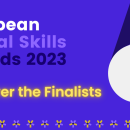Girls Go Circular
Girls Go Circular’s main goal is to equip at least 40,000 girls aged 14-19 across Europe with digital and entrepreneurial skills through an online learning programme on the circular economy. The project contributes to the gender equality objectives of the DEAP 2021-2027 and closely supports the European Institute of Innovation and Technology’s (EIT) flagship Deep Tech Talent Initiative, introducing deep tech topics into school curricula across Europe.
At the core of the project is the Circular Learning Space (CLS) – an online learning platform that offers students the opportunity to deepen their knowledge of the circular economy while acquiring digital competencies. Based on a learning-by-doing approach, the learning programme is aligned with several European competence frameworks: DigComp, EntreComp, and GreenComp.
Get to know the initiative
Training modules
All learning modules on the CLS are designed by the EIT Community and aim to equip learners with digital skills and raise awareness of the challenges related to the sustainable extraction, consumption, and reuse of natural resources. The modules tackle a broad array of topics and industries, such as raw materials, manufacturing, mobility, food, health, climate, and information technology. While completing the GGC online programme, students use digital tools and engage in activities such as planning social media campaigns, creating app mock-ups, and developing business plans. Pupils can choose between 13 thematic modules at different levels of difficulty aligned with the DigComp framework – Intermediate, Advanced, or Expert.
Teaching model
Considerable effort was invested in creating a solid relationship with teachers, favouring the project’s mainstreaming into school curricula. Teachers played a crucial role in implementing the programme, as they motivated and mentored students, dedicating class hours to the project or organising extracurricular workshops. The project team offered teacher training and help desk support and created Teacher’s Guidebooks, which include thorough guidelines, tips and tricks, and alternative activities on implementing each module in the classroom.
Annual Flaship Event
The Women and Girls in STEM Forum (WGSF) is Girls Go Circular’s annual flagship event, hosting high-level discussions on eliminating gender bias from STEM and ICT disciplines to inspire future EU actions on these themes. It also celebrates the participation of thousands of girls from several European countries in the project and offers them the opportunity to meet inspirational mentors from their respective countries.
In 2021, the WGSF gathered 500 participants online, including key stakeholders such as the European Commission, EIT Women, or the EU STEM Coalition. In 2022, the second edition of the Women and Girls in STEM Forum took place in a hybrid format, with 900 participants online and in-person in Brussels. 60% of the online participants had not done the GGC programme, showing the wide reach of the Forum leading to potential future strategic partnerships.
Why is Girls go Circular a good practice?
Girls Go Circular started in 2020 with a pilot phase in six countries: Bulgaria, Greece, Italy, Portugal, Romania, and Serbia. In 2021, the project expanded to Hungary and Poland, and in 2022, Lithuania and Slovenia also joined the project. North Macedonia, Montenegro, Cyprus, and Armenia participated in the project as guest countries.
In support of the students affected by the war against Ukraine, Girls Go Circular translated all its learning materials into Ukrainian, and workshops were held in five Ukrainian cities in 2022. The Circular Learning Space significantly expanded, hosting two introductory modules, 13 thematic modules, 12 languages, and 60,000+ registered users. Over 40,000 girls in 1000+ schools across Europe have completed the basic requirements and graduated from the learning programme.
What is ahead for Girls go Circular
In the upcoming years, the project will be opened to more countries, as the resources will be translated into the respective languages.
Moreover, the project will continue training girls in Ukraine, with plans to collaborate with several educational NGOs to support Ukrainian students and educators.
In the upcoming years, the learning platform will be structurally adapted to the increasing number of students and learning modules available to offer different learning pathways based on students’ interests. Future learning modules on the Circular Learning Space will have an even stronger focus on deep tech knowledge and skills.



